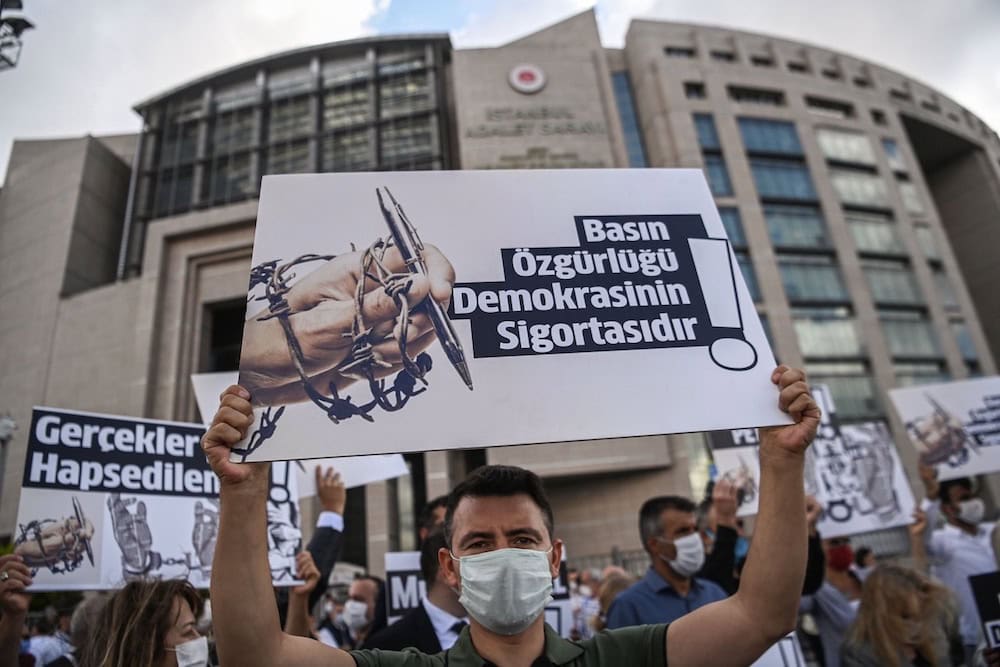Representatives of Turkish journalist associations warned Tuesday that press freedom is eroding under legal and political pressure marked by detentions, police violence and censorship, with one calling 2024 a lost year, the Stockholm Center for Freedom reported, citing the Media and Law Studies Association.
Felat Bozarslan, president of the Southeastern Journalists Association, highlighted that each year conditions worsen for journalists, who face both economic and legal challenges. He expressed concern over Turkey’s trajectory regarding press freedom, emphasizing the detention of journalists.
“Just recently, several journalists, including one of our members, were detained simply for performing their job,” he said. “Unfortunately, Turkey continues to move in a troubling direction regarding press freedom.”
Turkey remains near the bottom of global press freedom rankings, Bozarslan said, citing increasing legal harassment and censorship directed at critical reporting. “This environment pushes journalists toward self-censorship,” he said.
Turkey, which became the world’s biggest prison for journalists in 2018 during a state of emergency imposed after a coup attempt, was ranked 158th of 180 countries in the 2024 World Press Freedom Index published by Reporters Without Borders.
“These developments show the difficult circumstances under which journalism operates in Turkey,” Bozarslan added. “Media diversity is shrinking and defending truth has become increasingly risky.” He described journalism as being “trapped in a dark pit” and warned that the struggle for press freedom is likely to continue in 2025.
Mahmut Oral, Diyarbakır representative of the Journalists’ Union of Turkey, characterized 2024 as “a lost year” for press freedom.
“Compared to the previous year, 2024 has been more violent,” Oral said. “Police disproportionately targeted journalists during protests, such as May Day celebrations in İstanbul and demonstrations against government-appointed trustees in Van and other cities.”
Oral described incidents where journalists covering protests were struck by gas canisters, beaten with batons and exposed to tear gas. “Several colleagues were injured,” he said. “Many complaints were filed, but judicial authorities dismissed most cases, effectively ignoring the violence.”
Oral also pointed to Turkey’s controversial “censorship law” as a significant challenge. The law has led to multiple investigations and trials targeting journalists.
Enacted in October 2022, the legislation — officially named the Disinformation Law — criminalizes the spread of “false or misleading information” deemed harmful to public order. It allows authorities to impose prison sentences of up to three years for violations, a provision that rights groups say has been weaponized to suppress dissent.
The law’s vague language has drawn criticism from international watchdogs, who warn it could be used to criminalize legitimate journalism. Since its passage, dozens of journalists have been prosecuted or investigated under the statute, often for social media posts or reporting on politically sensitive topics.
Oral warned of further challenges, including the proposed “foreign agents of influence bill,” which critics view as a tool for criminalizing journalism. While earlier attempts to pass the bill stalled amid criticism, Oral said the government now appears determined to revive it.
“This bill could become the judiciary’s new weapon against the press,” Oral cautioned. “Media organizations must remain vigilant and push for its withdrawal.”
The bill introduces provisions that would impose prison sentences ranging from three to seven years on Turkish citizens or residents who “commit crimes against security or domestic or foreign political interests of the state upon instructions from, or in line with the strategic interests of, a foreign government or organization.”

